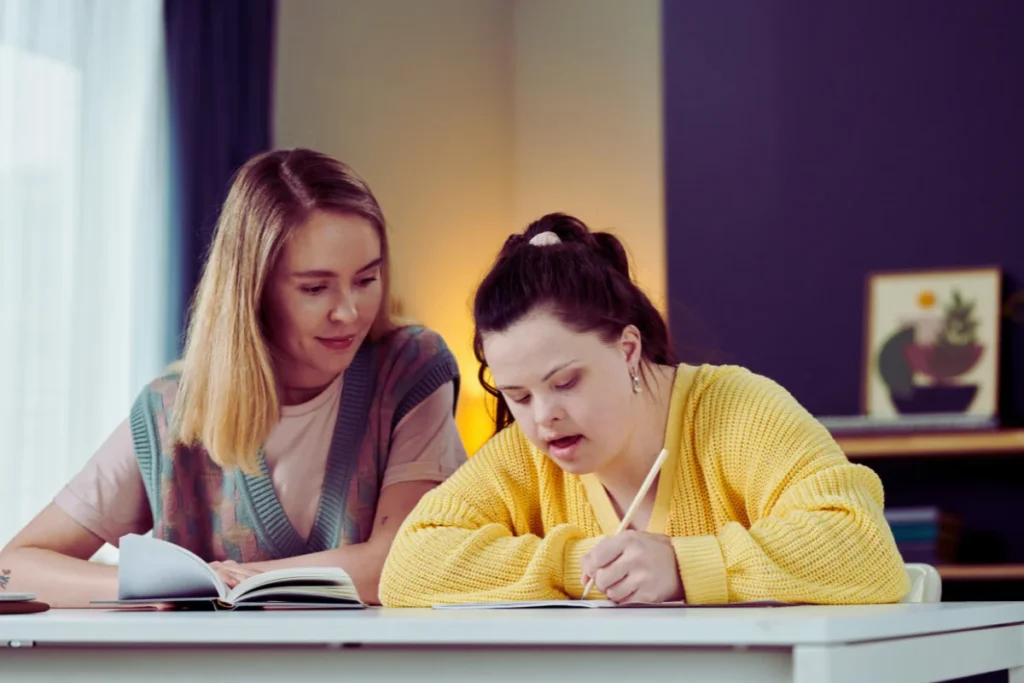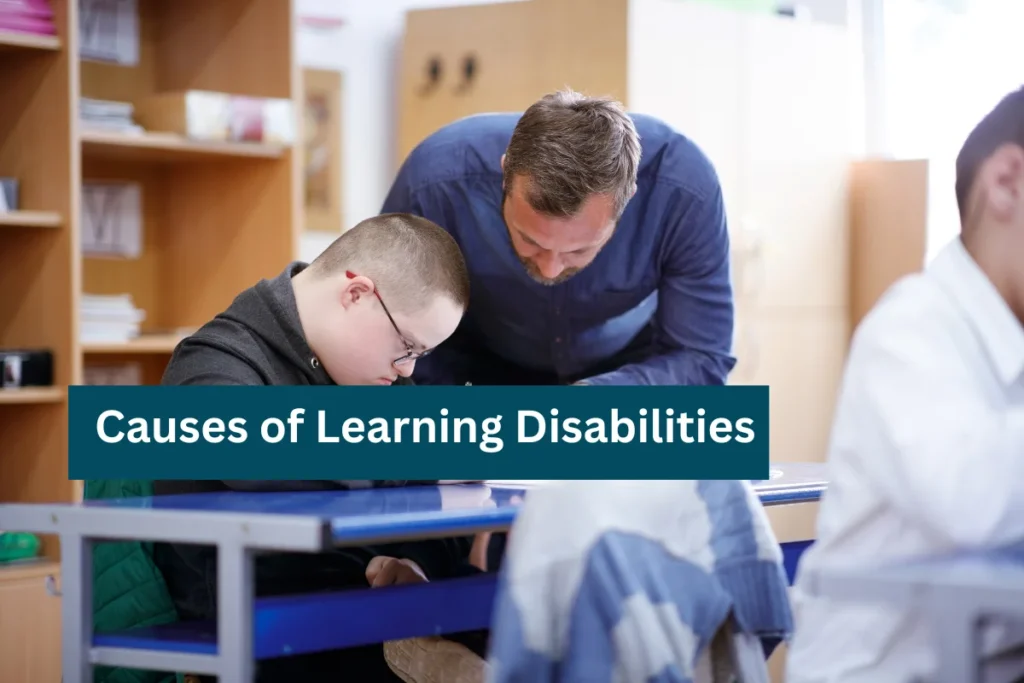Learning disabilities affect how the brain processes information, making tasks like reading, writing, and math more challenging. Causes of learning disabilities include genetic factors, complications during pregnancy or birth, and early childhood illnesses or injuries.
These challenges are unrelated to intelligence and require customised support to help individuals succeed.
What Are Learning Disabilities?
Learning disabilities are neurological conditions that affect specific areas of learning and understanding. While these challenges are lifelong, they can be managed with the right support. Recognising the signs of a learning disability helps provide timely support.

Common Symptoms of Learning Disabilities
- Difficulty learning new skills, such as reading, writing, or solving math problems.
- Trouble following instructions or remembering information.
- Struggles with organisation and time management.
- Social challenges, including communication difficulties.
What Are The Causes of A Learning Disability
Many factors can cause learning disabilities, often relating to brain development. Here are some of the main reasons.
| Category | Factor and Description |
| Before Birth | 1. Maternal Illness: Diseases like rubella or other infections during pregnancy can affect brain development. 2. Substance Exposure: Smoking, alcohol, or drugs during pregnancy can harm the baby’s brain. 3. Genetics: Inherited traits or genetic conditions like Down’s syndrome can make learning disabilities more likely. |
| During Birth | 1. Oxygen Deprivation: Complications that reduce oxygen to the brain during delivery can cause lasting effects. 2. Premature Birth: Babies born too early may have underdeveloped brains, increasing the risk of learning challenges. 3. Low Birth Weight: Being born smaller than average can sometimes lead to developmental delays. |
| In Early Childhood | 1. Infections: Illnesses like meningitis or severe fevers can damage the brain. 2. Injuries: Traumatic head injuries from falls or accidents can disrupt normal brain function. 3. Other Medical Conditions: Chronic health issues like Epilepsy can also affect how a child learns and processes information. |
| Associated Health Conditions | Some health conditions are closely linked with learning disabilities, such as: 1. Down syndrome: Those with Down syndrome have some degree of learning disability. 2. Cerebral Palsy: It is common for people with cerebral palsy to also experience learning difficulties. 3. Autism Spectrum Disorder: While not a learning disability, autism can overlap with learning difficulties. Learn more about the difference between autism and learning disabilities. |
| Environmental Factors | 1. Toxins: Exposure to lead or other harmful substances can impair brain development. 2. Neglect or Abuse: Emotional stress can slow intellectual and emotional growth. 3. Lack of Stimulation: Limited interaction, play, or exposure to learning resources can delay cognitive development. |
What is Profound and Multiple Learning Disability (PMLD)

Profound and multiple learning disability (PMLD) refers to a severe learning disability combined with other physical or sensory challenges. These difficulties significantly impact a person’s ability to communicate, move, and perform everyday tasks autonomously.
Key Characteristics of PMLD
- Communication Challenges: Many individuals have limited speech and rely on alternative methods like Makaton, Signalong, or Picture Exchange Communication Systems (PECS).
- Physical Disabilities: Some may face difficulties with mobility, requiring assistive devices or support for movement.
- Sensory Impairments: Vision and hearing challenges are common, making interaction more complex.
- Health Needs: Many individuals have additional medical conditions requiring ongoing care.
Support for Individuals with PMLD
People with PMLD need significant support, but they can still lead meaningful lives with the right assistance.
Areas of Support Include:
- Daily Activities: Help with eating, washing, and personal care.
- Health Management: Support for medical appointments and managing conditions.
- Decision-Making: Involving individuals in choices about their care and daily routines through accessible communication methods.
What Having a Learning Disability Can Mean
A learning disability affects everyone differently. Many people with learning disabilities can lead independent lives, including:
- Working and building a career.
- Having relationships and forming friendships.
- Living on their own and managing daily tasks.
- Earning qualifications and achieving personal goals.
It may be necessary for some individuals to receive extra support throughout their lives based on the severity of their struggles.
Support for People with Learning Disabilities
Learning disabilities may be diagnosed at any stage of life. While some people are diagnosed as children, others may not receive a diagnosis until adulthood. If diagnosed with a learning disability, support options include:
- Referral to health professionals for assessments and guidance.
- Access to specialised therapies, like speech or occupational therapy.
- Emotional and practical support for both individuals and their families.
- Participating in activities for learning disabilities can improve confidence and skills.
Families and carers play a vital role in creating a supportive environment that helps individuals thrive and reach their potential. Families need to know the qualities to look for in learning disability care providers to provide quality care and support.
Conclusion
Understanding the causes of learning disabilities helps us provide better support for individuals and their families. Whether it’s through early intervention, personalised education, or professional care, every step counts. For compassionate, expert care, visit Metro Care UK and see how we can support you or your loved one.
FAQs About Learning Disabilities
What are the top three causes of learning disabilities?
The main causes include genetic predisposition, complications during pregnancy or birth, and environmental factors like exposure to toxins or neglect.
What causes children to be disabled?
Children may develop disabilities due to genetic factors, prenatal issues (e.g., infections or substance exposure), birth complications, or early illnesses and injuries.
Is autism a learning disability?
No, autism is a developmental condition that affects communication and behaviour. However, some individuals with autism may also have learning disabilities.
How can learning disabilities be identified?
Signs include difficulty reading, writing, or understanding instructions, often observed during early childhood or school years. Professional evaluations can confirm a diagnosis.
What is the difference between autism and learning disabilities?
Autism affects social and communication skills, while learning disabilities impact specific academic abilities like reading or math. These conditions can coexist but are distinct.
How can schools support children with learning disabilities?
Schools can provide personalised education plans, adaptive learning tools, and one-on-one support to address individual needs.

